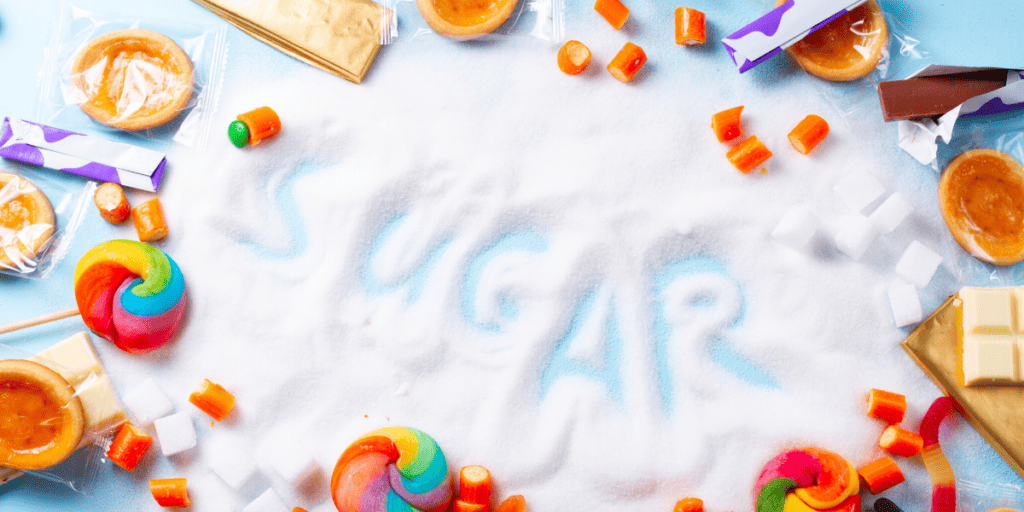
Sugar! It’s in everything from ketchup to yogurt and just about everything in between. It’s nearly impossible to avoid completely; however, there are 5 harmful effects of eating too much sugar that you really need to know. In this post, I’ll share some of the harmful effects of eating too much sugar, how much sugar is too much, and how you can reduce your sugar intake.
If you’re looking to lose weight, cutting back on sugar is a great start. You’ll also want to grab Your Key to Unlocking Weight Loss Secrets for more tips. You can grab it here now.
If you’re new to my blog, Welcome! I’m so glad you are here. My goal is to provide you with tips that help you stay strong and active as you age.
Here are some of my other blogs to check out after you read this one.
Sugar - more than just the white stuff in the sugar bowl
The word “sugar” may mean different things to all of us. So, I want to give you a broader definition than just that white stuff we poured over our cereal as kids. Yes, sometimes I had a little cereal with my sugar!
The sugar bowl is probably the least of our concerns. I’m far more concerned about the hidden sugars in the grocery aisle. What’s scary is that it is often hidden in the foods promoted as “healthy” or foods you’d never expect to have sugar. Here are just a few examples:
- Low fat yogurt - 47g sugar
- Sports drinks - 47g sugar
- Vitamin water - 32g sugar
- Bottled smoothies - 96g sugar
There are definitely healthier versions to pick from. Be sure to check the labels. I’ve been surprised more than once. It sounded healthy – until I checked the label. I cannot begin to tell you how many times I’ve been ready to put something in my cart, then decided I should check the label and back on the shelf it went. Marketers do a great job making the foods sound healthy on the front of the package.
And, one more thing. Although I won’t spend much time in today’s post on these, we don’t want to forget about the processed carbohydrates that are turned to sugar in the digestive process. The effect can be the same.
What do I mean by processed carbohydrates? Some examples are: white bread, pasta, white rice.
How much sugar is OK?
This was always so confusing to me. And, like everything else related to nutrition, as science learns more this could always change. For now, the recommendation is to keep processed sugar intake at about 6 teaspoons or less per day. There are no nutrients in sugar so there are no minimum requirements.
Ok, so how do you know how many teaspoons of sugar you’ve eaten? The food lables don’t tell us how many teaspoons of sugar are in a serving. They show grams of sugar. This was driving me crazy.
In case you’re curious too…
A teaspoon of sugar is approximately 4g. So, that means we should keep our total sugar at 24g (for 6 teaspoons) or approximately 100 calories (each gram of sugar is 4 calories) per day.
Now with a goal of keeping sugar at 24 grams per day and using food labels as your guide, you are well on your way to keeping sugar in a healthy range.
But… What happens when you eat more than 24g of sugar per day?
Harmful effects of eating too much sugar: #1 - excess stored as body fat
I had no idea! I mean I knew that too many calories would cause weight gain, but it never occurred to me that my body could only metabolize about 6 teaspoons of sugar per day. The rest is stored as body fat. That’s a big deal if you’re trying to reduce your body fat percentage.
Harmful effects of eating too much sugar: #2 - increase in sugar cravings
I can attest to this one! If you think about it the next time you eat a sugary treat, you may notice this as well.
It happens to me EVERY single time I have cookies, cakes, etc. There is something about sugar that creates this craving for more.
Then it becomes a vicious cycle. Other than special occasions, I try to avoid sugary treats as much as possible. I have found if I don’t have one, then I don’t crave more.
Harmful effects of eating too much sugar: #3 - increased risk of diabetes
Obesity, which is often caused by eating too much sugar, is the strongest risk factor for diabetes.
Over time, consistently eating too much sugar may create a resistance to insulin, which is a hormone produced by the pancreas to regulate your blood sugar.
Your resistance to insulin can result in increased blood sugar. This rise in blood sugar significantly increases your risk of diabetes.
Your doctor can run blood tests to check your blood sugar levels. As a general rule, I aim to keep my fasting blood sugar level below 100. Depending on other circumstances and family history, your doctor may have a different range in mind for you. Always check with your doctor.
Harmful effects of eating too much sugar: #4 - risk of heart disease
Not only can excessive sugar in your diet result in obesity, there is evidence that it may also contribute to an increase in your triglycerides, blood pressure, and inflammation as well as lower your HDL (this is your good cholesterol). These are all known risk factors for heart disease.
With no nutritional benefit and so many risks, reducing sugar should really be at the top of all of our priority lists. Wouldn’t you agree?
Harmful effects of eating too much sugar: #5 - depression
Just as eating a healthy diet can improve your mood, eating a diet high in sugar and processed foods may result in feeling blah, down and even depressed. Sugar may make you feel good in the moment, but those feelings aren’t likely to last.
How can you reduce your sugar intake?
Try some of these sugar swaps.
- Swap sugary juices, sports drinks, sodas, sweetened teas for water. You can add strawberries, orange slices, cucumbers, etc to give your water an extra boost of flavor without all the sugar.
- Swap the sugar-laden yogurt for plain yogurt. Plain yogurt is low in sugar. I like to add blueberries to my plain yogurt. If that isn’t enough sweetness, you can add a little stevia as an artificial sweetener.
- Replace your high sugar breakfast cereal for oatmeal. You can top it off with some fruit and almond slivers.
- Try grabbing some fruit instead of the cookie next time you are wanting something sweet. Honestly, the first time you grab the fruit you may not feel satisfied. The more you do it, the more your body will adjust. You may even find you start wanting the navel orange instead of the cookie.
There are many reasons for reducing the processed sugar in our diets. And, how great would it be if starting immediately you never ate (and never craved) processed sugar again?
Except, that is most likely impossible and at a minimum probably not a great long-term strategy.
Let’s say you are eating more that the 6 teaspoons or 24 grams of sugar per day, start by changing one thing at a time.
- If you are a soda drinker, start by replacing one soda with a bottle of water.
- If you have a candy bar every day at 2p to get a boost of energy to finish off your day, try grabbing an apple and some almonds.
Whatever change you choose, keep it simple and create a habit with that one change before going on to the next.
Before you go, be sure to grab Your Key to Unlocking Weight Loss Secrets. In here, I share how weight loss is not just about the calories you consume. There are 5 critical team players that need to be aligned to set you up for success in reaching your weight loss goal.
